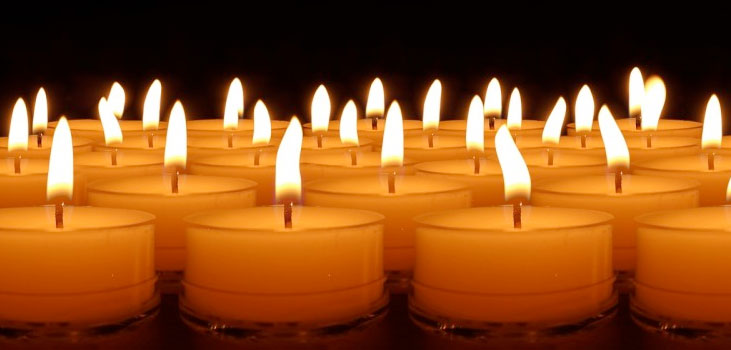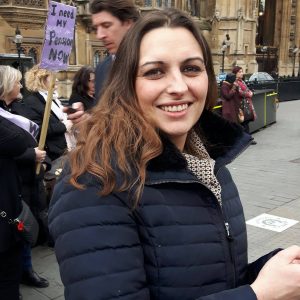Everyone has their own way of dealing with death and it can change for people over time. Dying Matters is an initiative which seeks to encourage people to have more open conversations about death, bereavement and grief over the week of the 14th-20th May 2018.
There are some commonalities in the ways that members of Gypsy and Traveller communities mourn and pay respect to those they have lost and yet, understandably, there is a great deal of difference between each individual and family. We asked Ivy Manning, Health Improvement Worker at Friends Families and Travellers and Romany Gypsy, about her experience of bereavements and funerals.
Is death and dying something that Gypsies and Travellers talk about, in your experience?
Not really, not until after it’s happened, you all kind of think “it’s not gonna happen”. When my grandad was ill, we all thought “he’s gonna get better, he’s gonna get better, it’s not gonna happen” so when it finally did happen, it was a shock, it was difficult.
A lot of Gypsies and Travellers grieve in a big way, I personally don’t, but most do. It’s a big thing with a lot of rituals.
Do you think the rituals help with the bereavement process?
Yeah, I think it does. It’s a respect thing, we have a fire and we like as many people to come to show respect. There’ll always be food, tea and coffee available, there’ll be a team of women or girls, mucking in. I don’t think it gives much time to grieve, but that’s what you initially do and then once they’re buried that’s when you can shy away and pull yourself back in.
Does everyone usually take part in this?
Some parts of the family can resist it, definitely. But most Gypsies and Travellers have big families, not everyone, but most families, so there’ll always be a niece or a nephew or an aunt or an uncle. If some of the family are taking it really badly, then everyone else will just rally round and get it done without them even having to worry. There’s always quite a lot of people on hand, so if someone can’t deal with it, there will be another member of the family to step up and they’ll just go for it.
You said that that’s not something that your family do?
They do, they do what’s expected. There’ll always be tea and coffee and there’ll always be someone there if people turn up. They call it ‘sitting up’, where you stay with the body, so there’s always someone there, wherever that’s taking place. My grandad died in hospital, but everyone came and set up at his place; if it was someone else, they’d go back to theirs. My family still keep the tradition on, so even if a couple of people don’t want to do it, the rest will push their grief to one side until after it’s all done.
I don’t know if it’s a good idea, all that time, you condense the grief down for weeks, and when the sitting up is done, it’s so quiet and that’s when it hits you. You’ve had hundreds of people around you and then it goes to nothing. There’s no levelling out, it’s just one end of the spectrum to another.
It sounds like it’s quite demanding, does that put a lot of pressure on families?
you need money or time to go and do shopping, someone will just do it. They’ll go out to the supermarket and bring back a carload. People might know what situation they’re in, but they wouldn’t say it, they’d just take that strain off. It might be difficult for the family, because they would know that that’s happening. It can have a mental impact, but most of us see that, and we’ll just rally round and remove the pressure. There’s no calculating at the end, or anything like that, someone will just go and help.
If a family couldn’t afford it, they might be a bit embarrassed. They could say they can’t do it because they’re grieving, but that would make them feel worse, because it’s part of our process, to pay respect and to have the sendoff, that’s the family saying “we’re doing you proud now”.
But everyone will just rally around. You wouldn’t have to tell anyone that
My granny died unexpectedly, and it was quite a shock. She passed so quickly. Then the next day people were arriving, the cupboards were opening and we hadn’t had time to get the shed ready, but people had had the phone calls and they were turning up with carloads of food and bottles of pop. Sometimes you’d like to take a step back and take a couple of hours, but at the same time you just say “thank you”.
So as much as it’s about the family putting on a wake for their loved one, it’s about the community being able to come together and share and pay their respect.
Yeah, absolutely. The community want to come and pay respect, they’ll give up work, they’ll come every day. They’ll source the firewood, make the fire and keep it going, it’ll be kept alight the whole time, you can’t let it go out.
Is there anything you wish that non-Travellers knew?
It’s emotional for everyone isn’t it, everyone has their own way of dealing with things. It’s a respect thing for us and it’s shame on the family if we can’t show that respect. If non-Travellers could understand or engage with the respect issue. There could be hundreds or thousands of people turning up and we’ll always get complaints. But we always make sure the undertaker tell the police. We tell them in advance how many people will be coming and let them know that there’ll be however many kids, grandkids and their families coming. We’re only asking for ten or fifteen minutes of time to let the hearse travel, but there’s always complaints, and it’s awful when all you want to do, as a family, is to say ‘goodbye’.
This Dying Matters Week, consider ways in which you can open up conversations around death, bereavement and grief with your loved ones.
As part of our work on the VCSE Health and Wellbeing Alliance, we have been working with Hospice UK, Marie Curie, The National LGB&T Partnership, Homeless Link and Together for Short Lives to create a resource for commissioners, service providers and health, care and support staff on delivering high quality, personalised palliative and end of life care for Gypsies and Travellers, LGBT people and people experiencing homelessness. Sign up to our newsletter to get alerted when the resource is ready.
Have you suffered from a bereavement?
You may have recently suffered from a bereavement and are in need of more support, either emotionally or financially. Here are some relevant sources of support which you might find helpful:
Struggling with money? You may be able to get Bereavement Support Payment if your husband, wife or civil partner died on or after 6 April 2017. Find out more.
Looking for bereavement information or support services? Use the NHS Choices website to find services available near you. Find out more.
Notes for Editor
About Friends, Families and Travellers (FFT)
Friends, Families and Travellers is a leading national charity that works on behalf of all Gypsies, Roma and Travellers regardless of ethnicity, culture or background.
Media Contact
Sarah Sweeney – Office hours Monday – Friday, 10am – 6pm
Tel: 07963 382 190 Email: [email protected]
Useful Resources
Friends, Families and Travellers Guide: Cemeteries and Burial Culture and Traditions for people from Gypsy and Traveller communities. View the guide.


